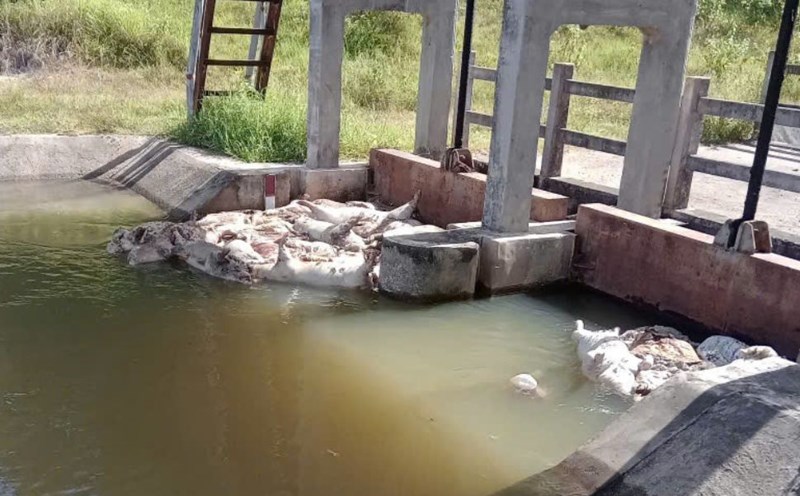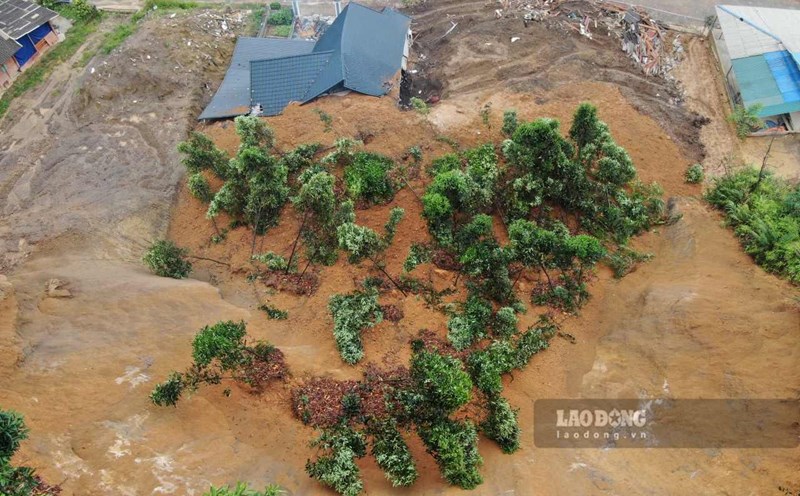Surrounded by garbage, posing a potential risk of pollution
In Hanoi, many canals are facing serious pollution when the water is clogged with garbage, causing congestion and affecting the living environment. Rapid urbanization and limited awareness of environmental sanitation are the main reasons why canals in the capital are in this situation. The only solution is to have regular and synchronous measures to collect garbage and clear the flow.
Recorded at Ke Khe canal, from Van Phuc street to Giang Van Minh street, the black, foul water, along with garbage thrown on the canal bank, has caused sewers to clog every time there is heavy rain. This situation is not uncommon in other areas of Hanoi. The trash bins are thrown into the ditch, causing congestion, making it impossible for water to drain, leading to flooding and directly affecting people's lives. Although the authorities have tried to arrange trash bins at drainage gates, littering continues.
According to Mr. Vu Anh Dung (a resident of Thuy Khue area), many people still conveniently throw their household waste into canals and ditches. Every time it rains heavily, this amount of garbage causes flooding, causing water to flood into people's houses. The Ke Khe canal sewer project was approved in 2008 with a budget of up to 205 billion VND, but to date this project is still unfinished, with no signs of continued construction.
Similarly, in the Nhue River area, the section passing through Ha Dong, garbage and mud obstruct the flow, causing water to flood into residential areas every time it rains, causing heavy pollution.
Mr. Tran Van Vui (residing in Ha Dong) said that the stench from black water that rises every day has seriously affected people's health. Although workers have made efforts to collect the garbage, this situation still recurs.
Ms. Nguyen Thi Lien, a worker at Enterprise No. 2, Hanoi Drainage Company Limited, shared that most of the waste thrown into canals and ditches is household waste. After each garbage cleaning, after just a few hours, the amount of garbage accumulates, causing congestion. If the nylon bags are not collected in time, they will flow into the sewers, blocking the flow.
Accelerating sewers, increasing dredging
Prof. Dr. Tran Duc Ha - former Director of the Institute for Water Supply and Drainage Research and Environment - said that urban canals have the function of draining water, but for many years they have been polluted by waste, causing congestion and affecting urban aesthetics. Although the city has recognized this problem, the solution is only a temporary solution, lacking long-term effectiveness.
According to Professor Ha, to overcome this situation, Hanoi needs to speed up the progress of sewer projects, increase dredging and unblocking canals, and synchronously plan urban drainage systems. Urban beautification also requires long-term solutions, avoiding encroachment and obstructing drainage work.
Associate Professor, Dr. Bui Thi An - Director of the Institute of Natural Resources, Environment and Communities - pointed out that the main cause of river pollution is the failure to control waste from domestic water, industry and craft villages. To minimize pollution, Ms. An said that there needs to be a system to collect and treat wastewater from the source, before discharging into the stream. Experts also proposed to enhance the role of functional forces and grassroots authorities in environmental management, while strengthening sanctions for the act of throwing waste into canals and ditches.
According to the provisions of Article 25 of Decree 45/2022/ND-CP on penalties for violations in environmental protection: Fine from VND 1,000,000 to VND 2,000,000 for the act of dumping, discharging, or discarding waste on sidewalks, roadsides or into urban wastewater drainage systems or surface drainage systems; dumping wastewater that is not in accordance with regulations on sidewalks, streets; discharging plastic waste generated from daily activities into ponds, lakes, canals, rivers, etc.











